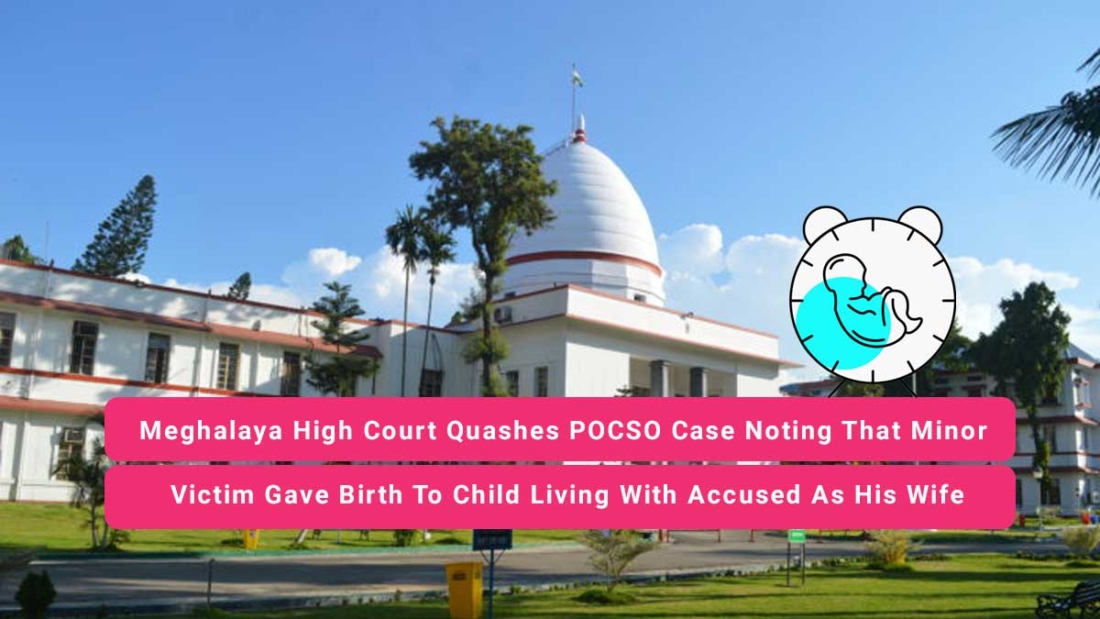An Application under Sec-482 of CrPC with a prayer to set aside and quash the criminal proceedings pending in the Court of learned Special Judge (Protection of Children from Sexual Offences (POCSO) Act, 2012), East Khasi Hills, Shillong. The case was filed under Sec-5(j)(ii) and Sec-6 of POCSO Act, 2012.
Brief facts of the case:
Petitioners in the case, were Husband and Wife. Husband was petitioner no.1 and Wife was petitioner no.2. During course of relationship, petitioner no.2 got pregnant and was taken to Nazareth hospital by petitioner no.1. The hospital authorities on confirming that the petitioner no.2 was pregnant and her age was about 17 years at that time, informed the police about the matter. After receiving information from Nazareth hospital, police lodged FIR. The police Suo moto charged petitioner no.1 under the offences of Sec-5(j)(ii) and Sec-6 of the POCSO Act, 2012. After investigation and recording of the statements of the petitioner no.2 and other witnesses, the chargesheet was filed and petitioner was made to stand trial before Court of learned Special Judge (POCSO), Shillong. The case was at the stage of framing of charges.
Petitioner’s Arguments:
- The first and foremost argument raised by the petitioners was that they were husband and wife. This was evident from the statement of the petitioner no.2 while recording the statements. She clearly stated that the petitioners were living together as husband and wife with the knowledge of their family members from both sides.
- Counsel of petitioners submitted that the petitioners come from rural background and were unaware about the provisions of POCSO Law. They had willingly cohabited together as husband and wife and the child was conceived out of such union.
- They argued that this was not a case where a heinous crime of rape was committed and after that, both the parties compromised and started living as a husband and wife. The both were in love and the relationship between them was consensual.
- The counsel of petitioners raised an argument that the POCSO Act, 2012 has been rightly enacted to safeguard children from sexual exploitation but in this case, POCSO Act may not be applied and the converse would only result in the breakdown of a happy family and leads the wife to the consequences of having take care of baby without any physical or financial support.
Observation of the Court:
- Considering all the submissions made by the petitioners and respondents, Court referred to Article 15 and Article 39 of the Constitution of India as to ensure that the tender age of child was not abused but rather protected from sexual exploitation. Court found this case and the issues of this case very complex in context of consensual or voluntary intercourse where, the girl is underage and the boy is above 18 years, living as husband and wife and perhaps wife gave birth to a child.
- Court admitted the fact that there was a sexual physical contact and relationship between both the petitioners which resulted in the petitioner no.2 gave birth to a child but the petitioner no.2 was below 18 years at that time and therefore, was considered as a “child” as per Sec-2(1)(d) of the POCSO Act.
- Now being a child and not capable of giving consent, the sexual contact by the petitioner no.1 was considered as offence under Sec-3 of the POCSO Act. If such sexual contact results in the female minor victim become pregnant, then it will be considered as an offence under Sec-5(j)(ii) of the POCSO Act. Punishment for Sec-5(j)(ii) of the POCSO Act is given under Sec-6 of the POCSO Act, 2012.
- Court looked at the scenario of what has happened between the petitioner no.1 and petitioner no.2 in this case and did not find the act committed in any logical and rational sense as a case of assault since there was no threat or attempt of offensive physical contact or bodily harm was made out on the petitioner no.2. Court considered the statement of petitioner no.2 that the act was voluntary and with consent on the fact that two were in love and living together as husband and wife.
- A similar Delhi High Court case of Kundan & Anr. Vs. State & ors, was referred by the court, in which the alleged victim girl who had gone missing and was found in the company of the accused. She stated that she got married with the said accused and has a child out of the wedlock. Parents of both the parties accepted the marriage. An application under Sec-482 of CrPC or quashing of the related FIR was filed and the Delhi High Court allowed the same.
- Another case referred by the Court was Ramgopal & Anr. Vs. State of Madhya Pradesh, 2021, where Supreme Court at para 13 held that,
- “…Handing out punishment is not the sole form of delivering justice. Societal method of applying laws evenly is always subject to lawful exceptions…” and again, it was said that “…the touchstone for exercising the extra-ordinary power under section 482 CrPC. would be to secure the ends of justice…”.
- Court respectfully agreed with the cases cited above favoured the petitioners and found the petition meritorious and same was allowed. Accordingly, the FIR and proceedings in Special POCSO case before the Court of the learned Special Judge (POCSO), Shillong was set aside and quashed.
Vaishali Jain, Advocate & Associate – Child Safety at Work & Riddhima Khanna
 Cart is empty
Cart is empty 

